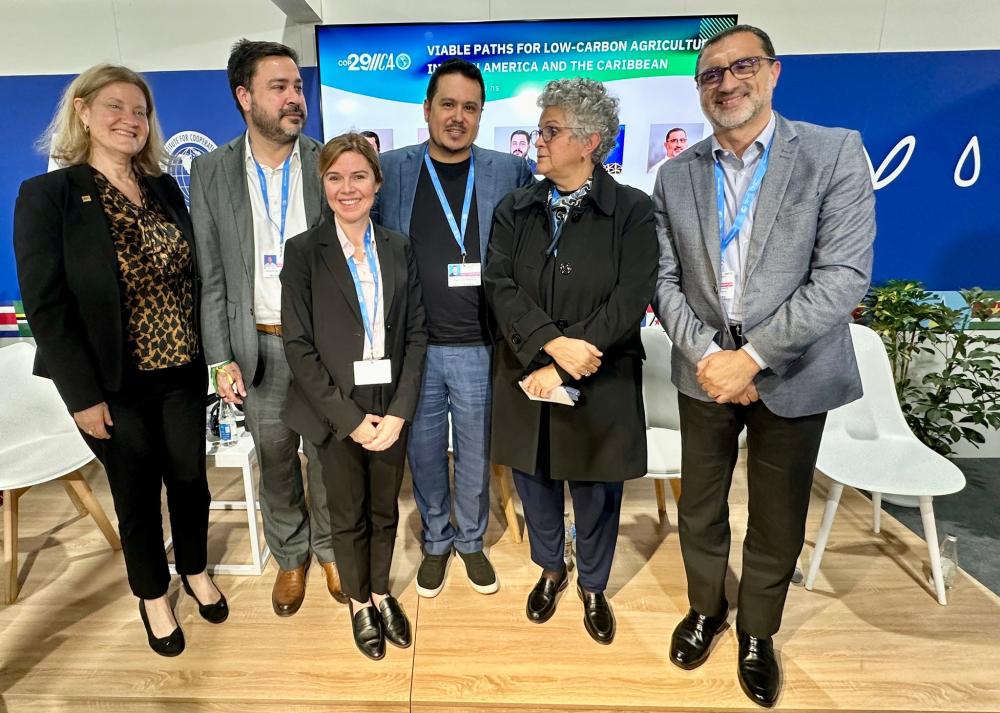The development of circular bioeconomy can help reduce waste, create new jobs and income, and contribute to sustainable development, according to concrete examples shared by leaders from the Americas at COP29.

Baku, Azerbaijan, 18 November 2024 (IICA) – The development of circular bioeconomy can help reduce waste, create new jobs and income, and contribute to sustainable development, according to concrete examples shared by leaders from the Americas at COP29.
In a session at the pavilion set up by the Inter-American Institute for Cooperation on Agriculture (IICA) and its partners at the large United Nations Climate Change Conference in Baku, Azerbaijan’s capital, progress was made in understanding the power of circular bioeconomy and how it can help protect nature while providing food, fibers, fuels, and ecosystem services to the world.
The Home of Agriculture of the Americas, as the pavilion is called, has had a place in the global climate change negotiations for the third consecutive year, having also been present at COP27 in Egypt and COP28 in the United Arab Emirates.
Thus, IICA, in a shared effort with partners and allies, once again ensured that the voice of agriculture from the Americas was heard in a strategically important global forum for the future of production and consumption patterns.
Izabella Teixeira, former Minister of the Environment of Brazil and Special Advisor to IICA for the G20, COP29, and COP30, attracted great attention during the panel moderated by Felipe Bittencourt, CEO of WayCarbon.
Teixeira noted that the global scenario has changed in recent times. “The past brought us here, but it does not play a role in the future. What has been done no longer influences us. First, because the political conditions that drove the Paris Agreement no longer exist,” she explained.
She emphasized IICA’s central role in ensuring that a food-producing continent like the Americas has a common vision in climate negotiations and builds a new narrative that integrates the public sector, private sector, civil society, and science.
“It is necessary to have a common voice that reflects our diversity. Latin America has very important natural assets for the world. We need to discuss an agenda that combines food security, energy security, and climate security: the true meaning of water, minerals, energy, and food security, and the new relationship with nature, which is the one that provides inputs,” she stated.
Paulo Pianez, Director of Sustainability at Marfrig/BRF, said that often producers lack support to access technology or financing: “To achieve low-carbon agriculture, the challenge is how to develop new financial instruments, funds, or credits so that producers, especially small ones, can get involved. This is the same reality in Brazil as in all of Latin America.”
Pianez revealed that Marfrig/BRF is the seventh-largest company in Brazil, and that the technologies available allow it to be part of a huge transformation process in its production methods, through the integration of agro-silvopastoral systems, which combine forests, pastures, and genetic breeding.
Fernando Sampaio, Director of Sustainability at the Brazilian Meat Exporters Association (ABIEC), explained that this entity brings together 43 slaughterhouse industries and represents 98% of Brazil’s beef exports.
“We are committed to climate action and ending any relationship with deforestation. The priority actions with producers are technical assistance. Brazil has technologies, and we need to disseminate good practices. The second point is to accelerate environmental regularization and also diversify financing. Without investment, we will not make progress in this transformation,” he stated.
In this regard, Caroline Prolo, from the climate financing management agency Fama Re Capital, pointed out that climate financing is not charity, but investment. “There is a need – she said – to invest in companies advancing in the climate transition, and the agricultural sector is a priority for our fund.”
More information:
Institutional Communication Division.
comunicacion.institucional@iica.int











